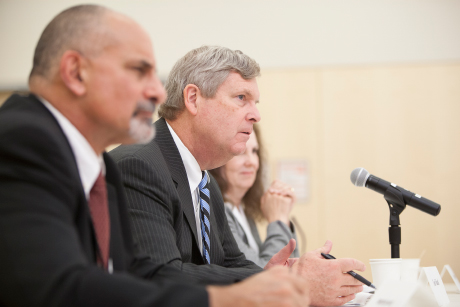Ag secretary briefed on nutrition, dairy, climate research
By Blaine Friedlander

In an agrarian world fraught with complication, U.S. Secretary of Agriculture Tom Vilsack met with Cornell faculty members July 29 to learn about solutions in the realm of dairy, nutrition and climate change. Kathryn Boor, the Ronald P. Lynch Dean of the College of Agriculture and Life Sciences (CALS), organized the event.
More than two dozen faculty members, primarily from CALS and the College of Veterinary Medicine, and scientists from the U.S. Department of Agriculture (USDA) Agricultural Research Service met with Vilsack to discuss dairy herd health, dairy and food processing, workforce development, and Cornell’s teaching, research and extension missions.
Vilsack also spoke with media to explain the new private-public foundation that will bolster the USDA’s supplemental research funding. In the 2014 Farm Bill, the U.S. Congress created the Foundation for Food and Agricultural Research and designated $200 million in seed money. The remaining $200 million will be tendered by private entities. Boor sits on the foundation’s new 15-member board to oversee its operation.
In the afternoon briefing sessions, Michael Kotlikoff, the Austin O. Hooey Dean of Veterinary Medicine; Daryl V. Nydam, associate professor; and Craig Altier, chair of population medicine and diagnostic sciences, explained the college’s diagnostic work to ensure bovine herd health. There are more than 600,000 dairy cows in New York, the third largest dairy state.
After Boor’s introduction of Jason Huck, Cornell’s dairy plant manager, Vilsack created a lighthearted moment when he asked: “Is this the guy responsible for Cornell’s chocolate milk?”
Instantly, Boor replied, “Yes, he is.”
“That was the best chocolate milk I have ever tasted,” Vilsack said.
In the roundtable discussion on researchers’ work in climate change and nutrition, Vilsack learned from Wendy Wolford, the Polson Professor of Development Sociology and associate director of the David R. Atkinson Center for a Sustainable Future (ACSF), how the ACSF operates and takes multidisciplinary approaches to solving problems. Vilsack was intrigued to learn about the center’s model to fund research through its Academic Venture Fund program.
Disciplinary barriers are hard, Wolford explained, but “we know multidimensional approaches work. The projects get major funding later,” she said.
“For any approaches that you have figured out, I’d be very interested,” Vilsack replied.
During the nutrition roundtable, Brian Wansink, the John S. Dyson Professor of Marketing and director of the Cornell Food and Brand Lab, with extension support specialist Kate Hoy, presented an extensive checklist that would spur children to more frequently choose healthy and nutritious food in school cafeterias.
Media Contact
Get Cornell news delivered right to your inbox.
Subscribe